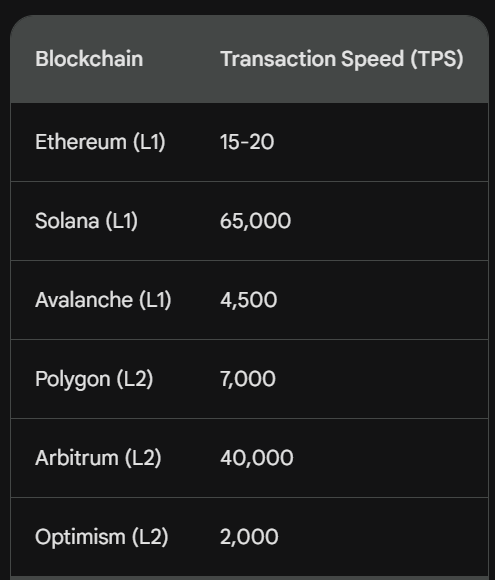Blockchain speed and utilization are important factors to consider when choosing a platform for trading. Especially some trading involve taking advantage of price differences between different exchanges, and the speed at which transactions can be processed can significantly impact the profitability of these trades.

Ethereum
Ethereum is the second-largest cryptocurrency platform by market capitalization and is home to a wide range of decentralized applications (DApps). However, Ethereum is known for its relatively slow transaction speeds and high fees.
Ethereum can currently process up to 15 TPS, but this is expected to increase significantly once Ethereum 2.0 is fully implemented. Ethereum 2.0 is a major upgrade to the Ethereum network that is designed to improve its scalability and security.
Despite its relatively slow transaction speeds and high fees, Ethereum remains a popular platform for arbitrage and other tradings due to its large ecosystem of DApps and its high liquidity.
Solana
Solana is a high-performance blockchain platform that is known for its fast transaction speeds and low fees. It can process up to 65,000 transactions per second (TPS), with a theoretical potential to reach 710,000 TPS in the future. This makes it a strong contender to centralized systems in terms of speed and efficiency.
In terms of real-world performance, Solana has consistently demonstrated its ability to handle high volumes of transactions. It has processed up to 1,900% more transactions than Ethereum, while charging significantly lower fees to users. At its peak, Solana has even processed over 4,800% more transactions than Ethereum.
These high speeds and low fees make Solana an attractive platform for a wide range of applications, including decentralized finance (DeFi), gaming, and cryptocurrency arbitrage. Its scalability and efficiency make it well-suited for high-volume transactions and the demands of fast-moving markets.
Other Blockchains
There are a number of other blockchains that are emerging as contenders for arbitrage trading.
These includes Hive, Avalanche, Polygon, BSC, Fantom, Arbitrum.
These blockchains offer a variety of advantages over Ethereum, such as faster transaction speeds, lower fees, and better scalability.
However, they may not have the same level of liquidity or ecosystem support as Ethereum.
Choosing a Blockchain for trading
When choosing a blockchain for trading, it is important to consider the following factors:
- Transaction speed: The speed at which transactions can be processed is essential for frequent trading. Traders should choose blockchains with high TPS to ensure that their trades can be executed quickly and efficiently.
- Fees: The fees associated with executing trades on different blockchains can vary significantly. Traders should choose blockchains with low fees to maximize their profits.
- Ecosystem support: The ecosystem support of a blockchain is important to consider, especially for professional traders who are looking to capitalize on market discrepancies across different DApps. Blockchains with large ecosystems of DApps will offer more opportunities for trades.
Recent Blochians like Solana, Aptos, Sui, Arbitrum, Optimism is a leading blockchain platform for trading due to its fast transaction speeds and low fees. Traders should carefully evaluate their needs and choose a blockchain that best suits their trading strategy.